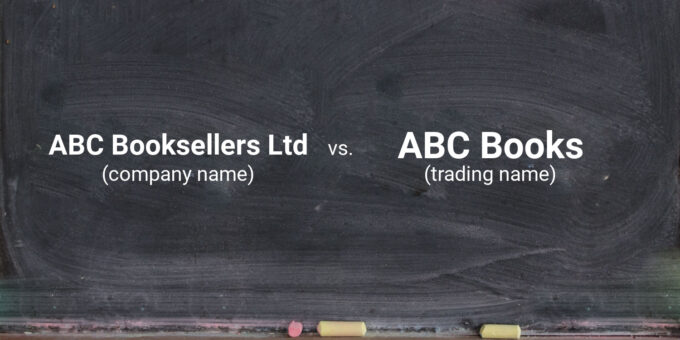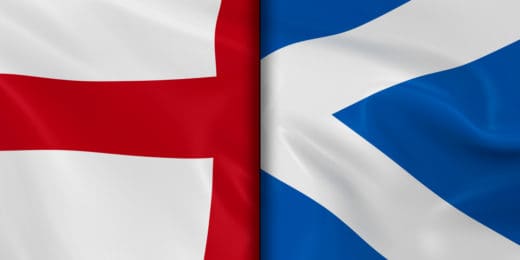It’s not uncommon for a company to operate under a different name from the one registered at Companies House. This alternative is known as a ‘trading name’, and the registered name is known as a ‘company name’.
We explain the difference between the two, why a limited company may decide to start doing business under one or more trading names, and the potential benefits and drawbacks of doing so.
Key takeaways
- Some businesses adopt one or more trading names as an alternative to their official company name.
- Trading names are not registered at Companies House but are still subject to certain rules. These include restrictions on the use of ‘sensitive’ words and expressions.
- Using a trading name can offer certain benefits, such as establishing different brands under a single legal entity. However, there are potential drawbacks to consider.
What is a company name?
A company name is the name that a company is registered under at Companies House. It must include ‘Limited’ or ‘Ltd’ at the end (unless an exemption has been granted) if it is a private limited company. A public limited company must have ‘public limited company’ or ‘plc’ at the end of its name.
This official, registered name appears on the certificate of incorporation, memorandum of association, articles of association, and any share certificates issued to shareholders. It’s also disclosed on the public register at Companies House. This is free to access and search online.
- How to choose a company name
- How to protect your intellectual property
- Exemption from using the word ‘Limited’ or ‘Ltd’ in a company name
A company name must be unique and cannot be too similar to any others on the register. This is one of several company name rules that exist to prevent businesses from misleading or harming the public.
Even if a company uses a trading name, it must continue to disclose its registered name, together with the other required information, on official business stationery, including websites, invoices, and letters.
What is a trading name?
A trading name (sometimes known as a ‘business name’) is the name under which someone carries on business. A company may adopt a trading name (or multiple) as an alternative to operating under its official name.
When a company uses a trading name, its website and other official stationery should contain a statement such as: ‘B.Smith Limited trading as Billy Smith Plumbing’. The abbreviation ‘T/A’ is sometimes used instead of ‘trading as’.
In this example, the business is registered at Companies House as ‘B.Smith Limited’, but the owner prefers to use the alternative ‘Billy Smith Plumbing’.
Unlike the company name, there is no requirement to register a trading name at Companies House or anywhere else. There is no register of trading names.
Rules and restrictions on trading names
While trading names are not registered under the Companies Act 2006, many of the rules in the act still apply, including restrictions on:
- The use of sensitive words and expressions, and names that could imply a connection with a government department, devolved administration, local authority, or specified public authority.
- The use of suffixes associated with a limited company or limited liability partnership (such as ‘Ltd’, ‘PLC’ or ‘LLP’).
- A name likely to give the false impression that the business is connected with a foreign government, an agency or authority of a foreign government, or an international organisation whose members include two or more countries or territories (or their governments).
- A name that misrepresents the nature of business activities to the extent that it is likely to cause harm to the public.
- The use of a name that is the same as a registered trademark.
If you adhere to the above rules, you can adopt and start using a trading name at any point. However, you should let certain parties know about this, including HMRC, your bank, suppliers and service providers, and existing clients. This will help you avoid any tax confusion and payment problems.
Whilst you can publish the trading name on your website, letters, and other business materials, you must continue to publish your company name too. Generally, this will appear in a less prominent location, such as your website’s footer.
The benefits of a trading name
There are several scenarios where a business may benefit from using one or more trading names rather than its official name. Here are some examples:
1. Differentiating products or services
If an established business decides to introduce vastly different products or services, its original company name may be unsuitable or potentially confusing for this segment of the market. In such instances, trading names can help differentiate new elements of the business and target specific audiences.
2. Pivoting the business
Companies often choose names that reflect the nature of their business activities. However, if a business decides to pivot and change its overall direction, its registered name may be incompatible with its new activities or objectives. Again, adopting a trading name offers a solution.
3. Facilitating expansion
Using one or more trading names can be an effective way to establish a local presence in different geographical locations, target new customers, and test or expand into new markets simultaneously without registering multiple new companies or changing the main brand.
4. Acquiring another business
Following an acquisition, a parent company may decide to continue running the new subsidiary under its established trading name rather than rebranding. This can be an effective way to ensure stability, maintain business momentum, and leverage customer trust. Ultimately, though, the acquired business will sit under the ‘umbrella’ of the parent firm.
5. Rebranding opportunity
While changing a company name is usually straightforward, it can be an administrative headache if you need to order new official stationery, change signage, and update bank accounts and contracts. If it’s no longer suitable and you want to stop using it day-to-day, you can simply start doing business under a trading name rather than changing your registered name.
Potential drawbacks of using a trading name
Trading names offer greater flexibility, but they are not automatically protected by law to the same extent as registered company names. This has the potential to cause certain issues, for example:
- No guarantee of exclusive use – someone else could use it for their own business in a different industry or register it as a company or domain name.
- Legal challenges – if you adopt a trading name that is the same as (or very similar to) an existing company name or registered trademark, you may be told to change it or risk claims of ‘passing off’ or trademark infringement.
Using trading names without careful consideration and planning could also confuse customers, mislead the public, or harm your brand reputation.
How to protect a trading name
To protect a trading name from these potential issues, you can:
- Register it as a trademark – trademark registration is the best solution because it will provide national legal protection and exclusive rights to the trading name.
- Register it as a company name – you can set up a dormant company to prevent anyone else from incorporating under the same name (or one that is very similar) or using it as a trading name in the same industry.
- Using the name consistently, such as in marketing documents – consistent use of a trading name in marketing material, etc, can prove you have a reputation or goodwill attached to the name, which can provide protection under the law of ‘passing off’.
You may also wish to consider registering your trading name as a domain name. This will help strengthen brand recognition and further minimise any potential risk of passing off.
So there you have it…
We hope you have found this article useful. Please comment below if you have any questions about this post, our company formation packages, or our range of corporate services.










Join The Discussion
Comments (4)
I will like to register an African food store in the UK exporting agricultural products from Nigeria.Can you assist in the formation of the Company name? And what are the licenses required in other to do this kind of exportation business in the UK.
Best Regards
Thank you for your kind enquiry, Banjo.
Unfortunately at present we do not accept orders from Nigeria due to Financial Action Task Force advice that Nigeria is on their ‘grey list’ for anti-money laundering/terrorist financing controls. As we are supervised by HMRC, we have decided not to accept any orders from Nigeria or where trade takes place in Nigeria until this situation changes. We apologise for any inconvenience caused.
With regards to what business licences you require, please take a look at our blog on business licences here: https://www.fatf-gafi.org/en/publications/High-risk-and-other-monitored-jurisdictions/Increased-monitoring-june-2023.html
Kind regards,
The Rapid Formations Team
I’m thinking of doing just this and was wondering about my website. If I create a new one with my new rebranding then I lose the domain to my company name so do people hold onto both domains – company and trading name and ‘use’ their trading name one?
Thank you for your kind enquiry.
Please note that domain names are not technically linked to company names, and domain names only offer protection to a brand if you are in control of the domain name.
We hope this answers your question.
Kind regards,
The Rapid Formations Team